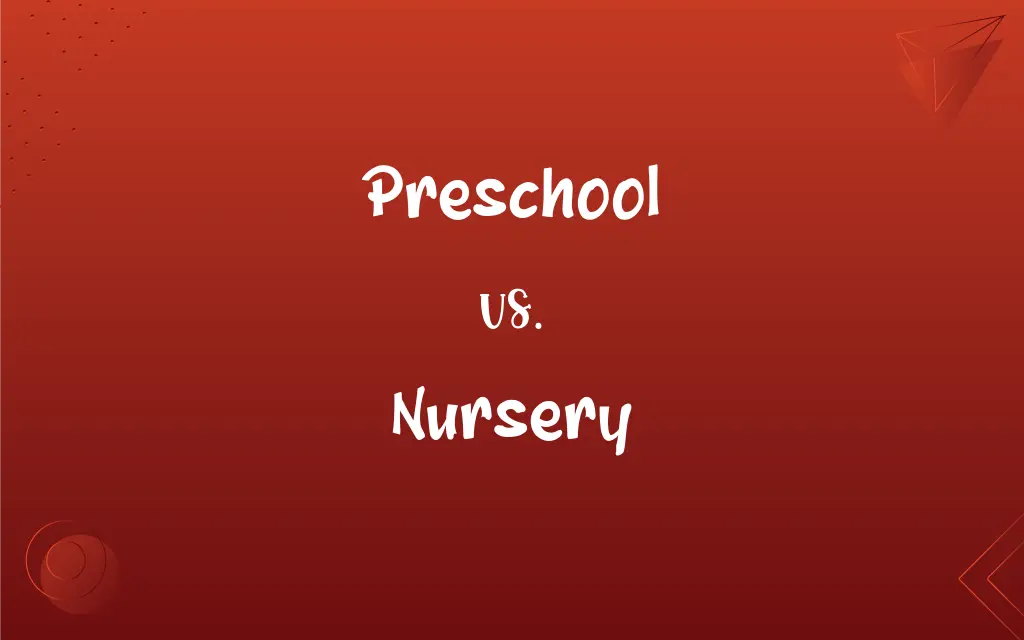Preschool vs. Nursery: What's the Difference?
Edited by Janet White || By Harlon Moss || Updated on October 15, 2023
Preschool is an early childhood educational setting for children before they start kindergarten, while nursery is a place for the care and supervision of young children, often infants and toddlers.

Key Differences
Preschool is a structured educational environment aimed at children who are below kindergarten age, typically between three and five years old. It emphasizes learning and development. In contrast, a nursery focuses on providing care and supervision to young children, often from infancy.
The main goal of preschool is to prepare children for formal education by enhancing their cognitive, social, and physical development. Nursery, on the other hand, often emphasizes a safe environment where parents can leave their children while at work or otherwise engaged.
Preschools usually have a curriculum, teachers trained in early childhood education, and specific learning outcomes in mind. Nurseries may not have such structured educational programs and are more centered on the general well-being and care of the child.
Preschool hours are often shorter, mirroring school-like schedules, focusing on both play and structured learning. In a nursery, the hours might be longer, catering to working parents and providing a space for children to play, nap, and eat.
In many regions, preschool is seen as the step before entering formal education. Nursery, however, is often sought for its caregiving features, especially for younger children who are not of age for more formalized learning settings.
ADVERTISEMENT
Comparison Chart
Primary Purpose
Educational preparation for kindergarten
Care and supervision of young children
Age Group
Typically 3-5 years old
Often infants to toddlers, can include preschool-aged children
Structure
Structured with a curriculum
More flexible, focused on caregiving
Duration
Shorter, school-like hours
Often longer, catering to full-day care needs
Primary Caregivers
Trained teachers in early childhood education
Caregivers, which might include trained staff but not always
ADVERTISEMENT
Preschool and Nursery Definitions
Preschool
An institution that provides early childhood education.
This preschool has a reputation for academic excellence.
Nursery
A place where young children and babies are taken care of.
She drops her daughter off at the nursery while she goes to work.
Preschool
A program designed for the educational and developmental needs of young children.
Their preschool program focuses on creative arts.
Nursery
A room or establishment for the care of babies and toddlers.
The hospital has a well-equipped nursery for newborns.
Preschool
A place where young children learn basic concepts through play and activities.
The preschool emphasizes hands-on learning.
Nursery
An institution for the supervision and care of young children.
The nursery ensures that children have structured playtime.
Preschool
An educational setting for children before they commence formal education.
She enrolled her son in a preschool to prepare him for kindergarten.
Nursery
An establishment providing a combination of care and basic education to young children.
The nursery incorporates some learning activities into their daily routine.
Preschool
A preparatory stage before formal schooling begins.
Attending preschool can benefit children's social skills.
Nursery
A space designated for infants and toddlers in larger institutions like churches or gyms.
The gym offers a nursery service for parents working out.
Preschool
Of, relating to, intended for, or being the early years of childhood that precede the beginning of elementary school.
Nursery
A room or area in a household set apart for the use of children.
Preschool
A school for children who are not old enough to attend kindergarten; a nursery school.
Nursery
A place for the temporary care of children in the absence of their parents.
FAQs
Can infants attend a nursery?
Yes, many nurseries accept and cater to infants.
How long is a typical preschool day?
Often, preschools operate for a few hours a day, resembling school-like schedules.
What is a preschool?
A preschool is an early childhood educational setting for children before they start kindergarten.
What is a nursery?
A nursery is a place for the care and supervision of young children, often infants and toddlers.
Are nurseries and preschools the same?
No, while both cater to young children, preschools emphasize education, and nurseries focus on care.
Do nurseries have educational programs?
Some might, but the primary focus is on caregiving.
Can preschool-aged children attend a nursery?
Yes, many nurseries accept children up to preschool age.
Are there different types of preschools?
Yes, including Montessori, Waldorf, and play-based.
At what age should children start preschool?
Typically, children start preschool between ages three and five.
Is preschool mandatory?
In most places, preschool is not mandatory but is seen as beneficial.
Is there a curriculum in preschool?
Typically, yes, focused on preparing children for kindergarten.
Do all preschools charge tuition?
Many do, but some might be publicly funded or subsidized.
Do preschool teachers need special qualifications?
In many places, preschool teachers require qualifications in early childhood education.
What activities might a child do in a nursery?
Playing, napping, eating, and possibly some basic learning activities.
How do nurseries ensure child safety?
They follow guidelines and standards set by licensing bodies or governments.
What are the benefits of preschool?
Socialization, learning basic skills, and preparation for formal schooling.
Do all nurseries operate full day?
Many do to cater to working parents, but hours can vary.
Is there an advantage to starting preschool early?
Early exposure can benefit cognitive and social development.
How do I choose between a preschool and nursery?
Consider your child's age, your educational goals for them, and your caregiving needs.
Why might parents choose a nursery over a preschool?
For caregiving needs, especially if they need full-day care.
About Author
Written by
Harlon MossHarlon is a seasoned quality moderator and accomplished content writer for Difference Wiki. An alumnus of the prestigious University of California, he earned his degree in Computer Science. Leveraging his academic background, Harlon brings a meticulous and informed perspective to his work, ensuring content accuracy and excellence.
Edited by
Janet WhiteJanet White has been an esteemed writer and blogger for Difference Wiki. Holding a Master's degree in Science and Medical Journalism from the prestigious Boston University, she has consistently demonstrated her expertise and passion for her field. When she's not immersed in her work, Janet relishes her time exercising, delving into a good book, and cherishing moments with friends and family.































































